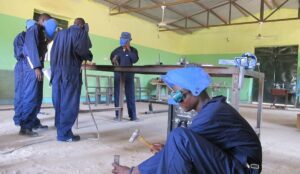

NBTE’s unbundling: Migrating mass communication graduates from generalists to specialists
By Jimoh Olorede, PhD
Mass Communication Programme which started in Nigeria about sixty-four years ago, before its commencement in many Nigerian Polytechnics, first with Jackson College of Journalism (named after John Payne Jackson, the publisher of Lagos Weekly Record), and later Department of Mass Communication, at the University of Nigeria, Usukka in 1960, has now been unbundled by the National Board for Technical Education (NBTE), an administrative-cum-academic Board that oversees vocational, technical and colleges of education in Nigeria.
The “Unbundling of Mass Communication” implies that certificates would no longer be awarded to graduates of the programme as Higher National Diploma (HND) in Mass Communication.
In adherence to the global best practices in technical education, especially with a view to widening career prospects of graduates, building skillful specialists, and training employable manpower, the NBTE led by the Executive Secretary, Professor Idris Mohammed Bugaje, in July 2022, organised a Workshop held at Federal Polytechnic, Nekede, Owerri, Imo State, with participants from 18 institutions, Advertising Regulatory Council of Nigeria (ARCON), a professional body that regulates and controls advertising in Nigeria, safeguards consumers’ interests and promotes local content, and the United Nations Children’s Fund (UNICEF), which is an agency of the United Nations that supports and administers programmes to aid quality education and skill building.
Consequently, five new programmes (Departments) namely Print Journalism, Broadcast Journalism, Advertising, Public Relations, and Film and Multimedia were proposed. However, after further deliberations, the proposed five programmes were streamlined into three which include: Strategic Communication and Media Studies; Journalism and Media Studies; and Film and Multimedia Production. Therefore, applicants would subsequently have to choose their courses of choice from either of these three new unbundled programmes at the point of entry.
So, it’s no longer HND Mass Communication, which is a generalization. It’s now either HND Strategic Communication and Media Studies (SCM), which encapsulates Public Relations, Adverting, and Development Communication; or HND Journalism and Media Studies (JMS), which covers Print, Broadcast and Digital Journalism, or HND Film and Multimedia Production (FMP), as distinct areas of specialization. A student who desires and aspires to be a communication strategist, for instance, would be specially trained in the art of Strategic Communication with a sound focus on media studies as a veritable mechanism and platform for the communication and dissemination of his strategically designed information.
The unbundling of Mass Communication programme in Nigeria has come to stay! The National University Commission (NUC) has also announced the unbundling of the programme in undergraduate levels into seven separate courses namely Journalism and Media Studies; Public Relations; Advertising; Broadcasting; Film and Multimedia Studies; Information and Media Studies; and Development Communication Studies. Getting to seven decades after the inception of the Mass Communication programme in Nigeria, students of the programme were being trained as ‘generalists’ expected to master all of these areas integrated as one.
Merging seven professional fields and expecting a trainee to master all is really absurd! This explains why some of our graduates in Nigeria are considered ‘half-baked’ and ‘unemployable’ as they were given much more to chew than they could swallow while undergoing academic training in school. You can’t expect ‘qualitative specialization’ from a generalization-based training.
Professor Bugaje led NBTE management is highly commended over the unbundling of Mass Communication and other wrongly-integrated and amalgamated academic programmes, especially in Nigerian Polytechnics. With the introduction of specialized areas of training, graduates from any of the programmes would now have a comparative advantage and prerequisite skills with adequate mastery of their chosen area of professionalism. Similarly, the Rector of the Federal Polytechnic Offa in Kwara State, Engr. Dr. Kadiri Kamoru and his management team members also deserve high accolades over the compliance by the institution and implementation of the NBTE’s directive on the unbundling.
However, the tasks before Prof. Bugaje and his team are enormous! Yes, the programme has been announced as unbundled, but what about implementation? Since the announcement of the unbundling, how many institutions (Polytechnics) in Nigeria offering Mass Communication and other unbundled programmes have implemented the Board’s directive? It’s the Board’s responsibility to ensure compliance and adherence. The NBTE is also urged to ‘lobby’ the Tertiary Education Trust Fund (TETFund) and other relevant stakeholders for timely intervention, especially in the area of fund disbursement for project execution in the implementation phase of the unbundling policy.
Dr. Olorede is pioneer Ag. Head, Department of Strategic Communication and Media Studies, The Federal Polytechnic Offa, Kwara State. He can be reached via [email protected] or 08111841887.




